A Life of Faith and Film in Papua New Guinea - The Story of Pastor Matupit Darius
Archives 29 Sep 2023 Graeme Humble
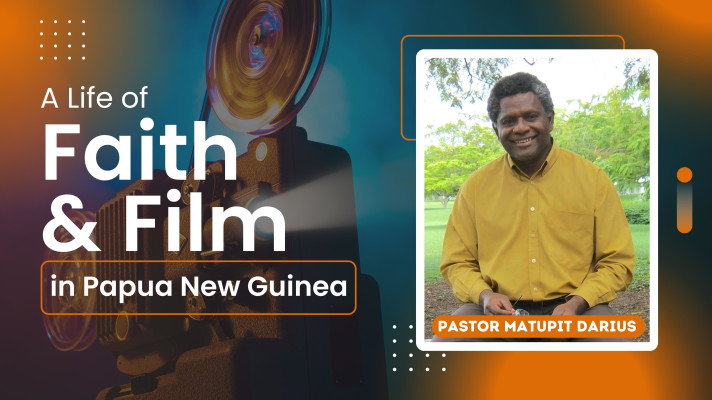
Here are some of the films that Pastor Darius Matupit has been involved with:
Faith in the Face of Challenges: A Pastor’s Journey
Stories 02 Jul 2023 Nathan Pomaleu
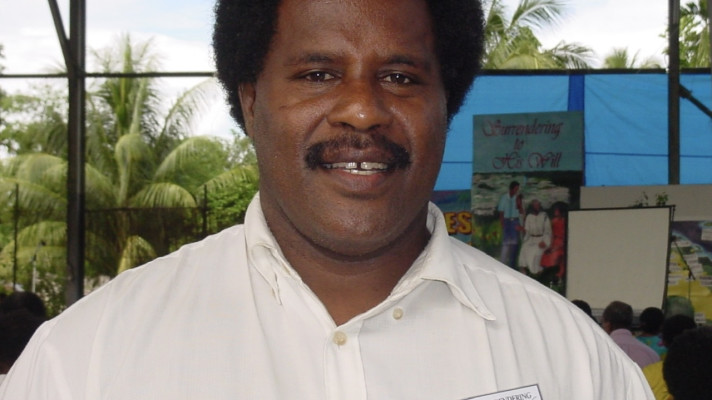
Early Life
Geoffrey Pomaleu was born on December 8, 1961, in Nonga Hospital, Rabaul, East New Britain Province, Papua New Guinea. The eldest of five siblings and one of a set of twins, he was born to Job Pomaleu Kepo and Martha. They were teachers at Rugen Harbor school, near Kambubu at the time. His twin sister, Julian Sevua, died on June 14, 2012.
Pomaleu began his elementary schooling in 1966 when his father was serving in the Baining Mountains in the southeastern part of East New Britain Province. After a period of two years, the family moved to Kambubu High School in 1967. His father assisted with the construction of the new college at Sonoma. He completed grade 6 in 1974 and commenced high school at Kambubu in 1975.
In 1977, the family transferred to Omaura Bible School in the Eastern Highlands Province. With his three sisters Julian, Glender, and Julie, and his two brothers, Ivan and Max, Geoffrey Pomaleu worked for a short time with his father on the farm and then moved to Manus to experience life in the village for three years. Pomaleu moved to Bougainville in 1983 and then to Port Moresby in 1984 and 1985. During those years of instability, between 1977 and 1985. he worked at various times at building construction, in a second-hand shop, and at a take-away food shop in Port Moresby.
Ministry and Service
Despite being considered a failure by the education system at that time, Pomaleu maintained his faith and faithfulness in church programs taking leadership roles when and where he was needed. Much of Pomaleu's involvement was with the youth department of the local church. Following his return to Manus in 1985, he was convinced by his parents to return to Omaura to do a Level 1 Bible Study program in 1986. The months that followed gave Pomaleu a sense of career. Up until that time he had not really considered ministry as a career choice.
Following his graduation from Omaura Bible School, Pomaleu was invited by the Morobe Mission to be a church pastor. After two years of pastoral ministry in 1988 and 1989, he applied to study for a Diploma in theology at Sonoma Adventist College in East New Britain. He was surprised to be accepted. There he met and married Jochabed Sonos whose family came from Mussau Island, New Ireland Province. He graduated with a Diploma in theology in 1992. His first-born son, Nathan, was born at Sonoma. While at Sonoma, he assisted with the establishment of a new church in the Baining Mountains where he had visited many times as a child.
Following his graduation, Geoffrey and his family was appointed to the Sepik Mission where he served as a Chaplain for Passam National High School and a church pastor for the nearby village church. He also conducted religious instruction programs for Passam primary school from 1993 to 1994. In 1995, Geoffrey was accepted to enter the degree program in Theology at Pacific Adventist University. While studying at Pacific Adventist University Jochabed and Geoffrey had two more children: Joan and Geoffrey Jr. He graduated with a Bachelors of Arts in Theology in 1998.
The following year, Geoffrey and his family were appointed to serve in the Biala District, West New Britain Province. He served just one year in Bialla and at the end of 1999 he was appointed to serve in Madang as the Youth Director for the Madang Manus Mission where he remained until 2003. While working in Madang he attended his first summer school at Avondale University College in Australia.
Significant Events
In 2001, Pomaleu was ordained to the ministry as a pastor of the Seventh day Adventist Church by the Papua New Guinea Union Mission (PNGUM) president, Wilson Stephen, and the Madang Manus Mission president, John Wawa, at the Madang town church. While serving in Madang Manus Mission in 2003, Pomaleu was debilitated with a serious illness that almost cost his life. After recovering, he was appointed to serve in PNGUM as the youth director in 2004. He was reappointed in 2005 and remained until 2008. He graduated with a Master’s degree in youth ministry in 2006.
In 2009, Pomaleu was invited to serve the Morobe Mission as the general secretary. After serving as the general secretary from 2009 to 2011, he was invited to serve as the president of Morobe Mission taking over from Piuki Tasa who was retiring. In 2015, he was appointed president of the PNGUM.
Pomaleu took up his duties as union president in September of 2015. But within just a few months his health condition started deteriorating and he found himself under continuous medical care. On July 4, 2016, he died in the Angau General Hospital. Left to mourn were his wife and three children. Jochabed Pomaleu continued to be the children’s ministries director for the PNGUM.
Contribution
Geoffrey Pomaleu’s leadership skills enabled him to relate to all classes of people. In 2000, he led the Madang Manus youth to a congress held at Wom Memorial Beach in Wewak Town. In 2005, while he was serving as the PNGUM youth director, he organized a successful country-wide youth congress at Kambubu High School. In 2007, he and his team led the largest ever delegation of Pathfinders from Papua New Guinea to a South Pacific Division Pathfinder Camporee, and then hosted a PNGUM camporee at the end of the year in Manus. While serving the local mission in Morobe, Pomaleu also helped expand the Morobe Mission’s infrastructure. A multipurpose hall was constructed, primary schools were developed, a secondary school was opened in Ragiampun Markham district, and donations were given to assist smaller missions.
Traditional Contribution Ceremony Supports PNG for Christ Campaign
News Stories 05 Jun 2023 Media Officer
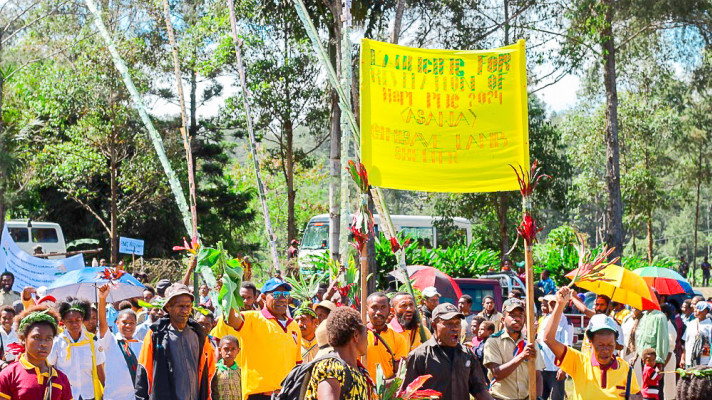
On Sunday 4th of June, the Seventh-Day Adventist community of Asaro Watabung District witnessed a one-of-a-kind traditional contribution ceremony towards the upcoming PNG for Christ campaign next year. The event took place at the district headquarters at Mapemo.
Churches from the four divisions in the district came together to contribute money using a traditional method of payment. The money (notes) were tied to a long bamboo pole and presented to the district. This method of payment is usually done when paying for bride price and compensation settlements.
In addition to the contributions from the churches, Ilopanek Foundation (Someone Who Cares) Inc, a humanitarian nonprofit organization, donated a total of K100,000 to this project. While pledging the funds, the president of the Foundation, Mr. John Glanville, said, “It is worth giving for a worthy cause to help transform the lives of our people in the community and we are proud to be part of this great initiative by the Seventh-Day Adventist Church community here in Asaro Watabung district.”
The event was witnessed by many distinguished guests including Pastor Malachi Yani, Papua New Guinea Union Mission of the Seventh-Day Adventist Church President, Pastor Joanis Fezamo, Eastern Highlands Simbu Mission of the Seventh-Day Adventist Church President, government representatives, business representatives, community leaders and gospel workers.
Pastor Fago Peter, the District Director for Asaro Watabung District, was pleasantly surprised by the outcome of the contribution. “The outcome is unexpectedly unbelievable as we didn’t expect the churches to come with such amounts of money in a short period of time, like they did today for only two weeks,” he stated.
Another missionary Wesley Moirafa shared a heartwarming story from the event. “While gathering with our congregation and contributing, we were surprised to see drug addicts who joined us and contributed money towards this great cause of the gospel commission,” they stated.
The PNG Campaign for Christ is making great strides in its outreach mission in Papua New Guinea. An example is the traditional donation ceremony held in the Asaro-Watatabung district, which is a testament to community unity and support for the cause.
Story Source: HERE!
“Celebrating the Joy of Being an Adventurer: World Adventurer Day at Busanim Creek Seventh-Day Adventist Church”
News Stories 20 May 2023 Daniella Simet
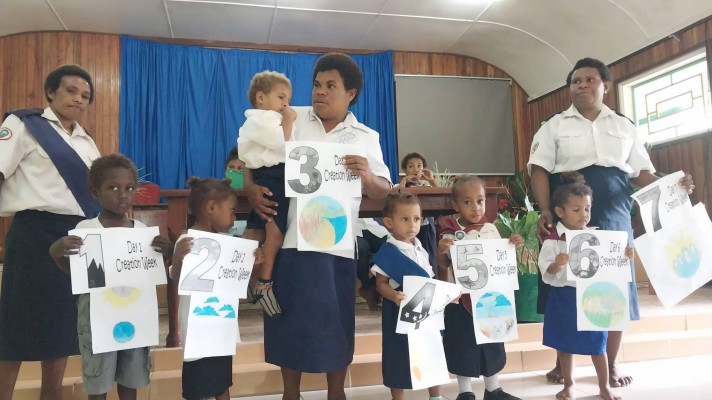
Yesterday, May 20th, 2023, Busanim Creek Seventh-Day Adventist Church celebrated World Adventurer Day. This special day is dedicated to celebrating the wonderful journey that Adventurers are on. Adventurers are children aged 5-9 who are part of the Seventh-day Adventist Church’s youth ministry program. They learn about God, nature, and themselves through a variety of activities and programs.
The theme for World Adventurer Day 2023 was “A Wonderful Journey.” This theme reflects the fact that being an Adventurer is a journey of discovery and growth. The program was led out by the little children assisted by their parents, guardians and teachers. The church was delighted to witness these young Adventurers discovering new things about themselves, God, and the world around them. They also learnt how to collaborate, solve difficulties, and create new friends.
After the program, a combined lunch was held where children could fellowship together and eat. World Adventurer Day is a time to celebrate the wonderful journey that Adventurers are on.
Busanim Creek Seventh-Day Adventist Church was proud to celebrate this special day with their young Adventurers.
“The Redemption of a Warrior: Paul Piari’s Inspiring Story”
Archives 08 May 2023 Kenneth Vogel

PAUL PIARI (1927 - 2010) - Paul Piari, born as a tribal warrior from Engan Province in the highlands of Papua New Guinea, became a Seventh-day Adventist pastor, opening new territory in the country, often in the face of fierce persecution.
Early Life
Piari was born in 1927 in Niunk village beside the Lagaip River. At 7,200 feet above sea level, it was an isolated high-altitude region (now known as Laiagam) in Engan Province of Papua New Guinea.
His family was part of the Piolai clan of the Piapri tribe. His father, Nun, and mother, Titam, in the way of their ancestors, taught their children to respect the eternal God and His law, including not to fight and kill. They believed in a personal God from “the land of mystery” who created the world and to whom each person is accountable.
Piari rebelled against all this. Given the name Amusa the son of Nun at birth, he became known only as Piari from an early age due to his fighting spirit and his skills as a warrior. “Piari” in the Engan language means warrior or fighter. He became a feared fight leader, injuring and killing during tribal warfare.
The world changed dramatically and quickly for Piari’s tribe once the reach of colonial government impacted their highland home. Tribal fighting was outlawed by the government, but that did not deter Piari and his tribe or their enemies. Ultimately, Piari was imprisoned for a period due to his involvement in tribal fighting, although his fighting spirit could not be broken.
When Christian missionaries did reach this highland region, Piari was surprised at how close Christianity was to the beliefs and teaching of his godly parents, both of whom were deceased by this time. Initially, he attended mass as the Roman Catholics were the first group to enter his village. When the Lutheran Church came, his sister, Sanison, began attending. Piari joined her after the Lutheran pastor made the point to him that Mary, the mother of Jesus, should not be worshipped as she was an ordinary person, albeit with an extraordinary role as the mother of the Savior of the world.
Piapin, Piari’s younger brother, left the area to attend a school operated by the Seventh-day Adventist Church at Rakamanda near Wabag, a two day walk east of Laiagam. After some time, Piapin visited his home and shared what he was learning about Christianity, using his small Bible in the process. For the first time Piari, heard of worshipping God on the seventh day of the week. In time, he built a Seventh-day Adventist church on his land at Niunk, his home village.
Those opposed to the work of the Seventh-day Adventist Church burned the new church to the ground three times. Local government leaders were fearful that Piari would unleash his fighting spirit to payback. But no reprisals took place.
Education and Marriage
In search of education, in late 1956 Piari travelled east on foot to the Seventh-day Adventist school at Rakamanda. He did not remain there, walking, first, further east to the Church’s school at Moruma in the Chimbu region, and then, with another young man, to the Kabiufa school in the Eastern Highlands. However, he returned to Moruma and spent 1957 attending school there to complete Grade 1.
In 1958, he retraced his steps to the school at Rakamanda and attended school there. During that year, he was given work teaching small children how to read and write. These two years were his only years of formal education. Though not baptized himself, he began telling Bible stories to the children and encouraging them to follow Jesus. Subsequently, he was in the first group to be baptized and join the Seventh-day Adventist Church in the Lagaip region on September 1, 1958.
Following a practice that had become popular to take a Christian name when baptized, Piari chose to be called “Paul,” after the great evangelist missionary in the early Christian church. He also decided to keep the name his tribe had conferred on him, Piari (warrior/fighter) as he had now understood himself to be a “warrior” on God’s side of the great controversy between God and Satan.
During his time at Rakamanda, Paul Piari married a Lutheran girl more than ten years his junior, Kinduruwan. She also attended the school as a student in 1958. They were married on October 5, 1958, after Kinduruwan’s baptism. After her baptism she also adopted a Christian name, Dorcas.
Paul and Dorcas Piari became the parents of six children: Wason, Ellen, Nathan, Opah, Paita, and Popone.
Career / Ministry
Piari’s formal career began in 1958 with a teaching position in the school at Tambai. Piari was based at Tetemanda during this time. In 1960, Piari was asked by expatriate missionary, Alexander Campbell, to commence church work in a new area as a sub-district leader at Yakananda or Kulita. Here, Piari was attacked with sticks and stones by about forty men. If it was not for the intervention of a leader in the village, Piari would have been killed. Covered in blood, he stood up and shook hands with his assailants. A local young lad observed all this, felt sorry for Piari, and lent a hand. He followed Pairi who enrolled him in the Seventh-day Adventist school that was at that time being established in Laiagam. That young boy, Timothy Pailitu, later became an ordained pastor of the Seventh-day Adventist Church. Pailitu was not the only witness impressed by Piari’s response. Others were also shocked by the violence perpetrated on Piari and amazed by his Christian response.
In 1961, Paul and Dorcas Piari were sent to open work in Sirunki. Piari was again a sub-district leader in the Laiagam district. The people in this high-altitude region (8,000 feet above sea level) between Laiagam and Wabag reacted angrily to the Piaris’ presence. A large group of men severely assaulted Paul Piari. The leader of that group was imprisoned for three months by the government officer. Piari used aids such as picture rolls and fingerphones. These small plastic gramophones were turned using just a finger. Everyone wanted a turn in spinning the record with their own finger and hear their own language coming back to them from this machine, all the time hearing the gospel story of Jesus. Once a church was established on one side of Lake Sirunki, Piari worked to establish a church on the other side of the lake.
Paul and Dorcas Piari were often asked to initiate the work of the Church in new areas in Enga. One such area was Maramuni, still in the Laiagam district but between between Enga and West Sepik. In 1962, Paul and Dorcas Piari, along with Pastor Martin Pascoe, walked from Laiagam to Maramuni, encountering steep slopes, raging rivers, snakes, and leeches while carrying personal effects and building materials with which the Piaris could set up their home. The establishment of the church was in no small part due to a kindness that Piari had earlier shown to a man from Maramuni by inviting him to sleep in their small house, giving him food, and sharing the gospel story with him.
The next assignment for the Piaris, in 1963, was at Porgera and Paiela, over tall and rugged mountains west of his home base at Laiagam. Piari was now working closely with expatriate missionary Len Barnard, who was based in Laiagam beginning in 1962. In late 1963, Piari was asked to lay the foundations for a school at Aiak. Ultimately, this was to become a very important training center for lay missionaries. Piari was by now a well- known and respected pioneering missionary. Robert R. Frame, secretary of the Australasian Division, wrote of him:
Piari is a man of Christlike character who has repeatedly been beaten, stoned, jumped on and thrown into the swamp. When his enemies have done their worst he gets to his feet and extends his hand with a smile, suggesting, “Now you have done what you wanted to, let’s be friends.” In this spirit he usually disarms his opponents and gains permission to tell his story of the Saviour who loves them.
In 1964, the first Adventist-owned aircraft, VH-SDA was brought into service with a dedication on June. It was based with pilot Len Barnard at Laiagam. Soon after the arrival of the aircraft, Paul and Dorcas Piari and their children were ferried to Kopiago. What would have taken five days of walking over mountainous terrain took just forty minutes in the new aircraft. Here Piari and his family were to establish the church for the first time amongst a language group totally foreign to them.
For the next two years, 1965 and 1966, Piari served beside Barnard, based in his home village of Niunk in Laiagam. Often accompanying Barnard, together they were to establish over 200 church congregations. During this time, Paul Piari attended the General Conference Session in June 1966, held in Detroit, Michigan, United States, as a delegate of the Australasian Division.
Paul and Dorcas Piari and their family were transferred to the Southern Highlands of Papua New Guinea in the second half of 1967. New work was started with the Imbogu- and Kewapi- speaking people of the Ialibu district. On October 28, 1967, Paul Piari was ordained during the Western Highlands Mission Session being held at Laiagam. He was the first Engan to be ordained as a pastor of the Seventh-day Adventist Church.
Following his ordination, Piari worked for three years at Kiunga in the upper reaches of the Fly River where he again established the work of the Church in the district. In 1971, he was transferred to Menyamya in the heart of Kukukuku territory. The Kukukukus were a warlike mountain people who had a reputation for treachery, a quick temper, and violence. Since the Seventh-day Adventist Church had already been introduced to the Kukukuku people in Menyamya, Piari’s assignment was to extend the work of the Church into the uncharted region around Aseki. Initially, his family remained at Menyamya, but once ground was made available, and a home and church built, Piari relocated his family.
In 1973, Piari and Dorcas Piari were asked to commence the work of the church in Wau and Bulolo, located in the mountains of the Morobe Province. However just some months after settling there, Dorcas Piari became seriously ill and church leaders returned the family to the Western Highlands in order for her to have ongoing medical support. Piari cared for the church congregation at the Adventist Togoba Health Facility. While there, Piari started a school. He also travelled to the Baiyer River region and established a church there despite strong opposition.
In 1977, Piari was approached by some government leaders to make himself available for the national elections, contesting the Laiagam Open seat as a member of parliament. He was conflicted about how to proceed, but after prayer, he stepped aside from ministry for a time to contest the national election. He was not elected and Piari recognized this as God’s will for his life. He then served as a layman for nearly three years. During that time, he continued to establish a number of congregations, including one at Tomba (high in the mountains between Mount Hagen and Wabag), where he started a church and school.
Paul Piari returned to fulltime ministry late in 1979. He was given leadership as district director for the Wapenamanda District in the Enga Province. In 1984, Piari and Dorcas Piari were appointed to work in Mount Hagen, the capital of the Western Highlands Province. In that year two new churches were started. Their ministry in the Mount Hagen region continued through 1987.
Later Life
Paul Piari retired at the end of 1987, staying near Mount Hagen. In retirement, he continued active service, running branch Sabbath Schools, preaching in the marketplace with a picture roll, and visiting churches. Later, he and Dorcas moved to Port Moresby, the capital of Papua New Guinea, to be close to their first-born daughter, Wason. Piari continued running branch Sabbath Schools till his untimely death on September 3, 2010, when hit by a car as he was crossing the road.
Legacy
For more than four decades, Paul Piari, with the dedicated support of his wife, Dorcas, served as a pioneer missionary. He opened new areas to the Seventh-day Adventist Church across many regions of Papua New Guinea, often in the face of fierce opposition.
Original Story Link: HERE
Praying Down Walls
Devotionals 30 Mar 2023 Sabbath School

There’s an expression in English: “to be painted into a corner.” Imagine painting the floor of a room but then realizing that you have wound up in a corner and cannot get out—except by walking over the fresh paint. You have to stay there until it dries!
Sometimes our faith seems to paint us into a corner. We arrive at a situation, and, like the wet paint on the floor, our faith “traps” us. We look at the situation, and either we have to reject God, faith, and everything we have believed in, or our faith compels us to believe what appears impossible.
God brought the Israelites to a corner. After they had wandered for 40 years in the wilderness, God did not lead His people to empty, peaceful grasslands. God led them to one of the most strongly fortified cities in the whole area. Then they had to walk around Jericho in silence for six days. On the seventh day, God told them to shout—and that shouting, together with the trumpets, would bring victory.
Shouting loudly was not going to cause vibrations to trigger the walls to collapse. When God called the Israelites to “shout,” it was the same type of shouting that David writes about in Psalm 66: “Shout for joy to God, all the earth! Sing the glory of his name; make his praise glorious!” (Ps. 66:1, 2, NIV). This shouting was praise! After six days of looking at the huge walls, they must have concluded that they hadn’t a chance of breaking them down themselves.
When God is on the verge of doing something new in our lives, He may bring us to a Jericho, for He may need to teach us that the power to triumph does not come in our own strength and strategies. Everything we need comes from outside of ourselves. So, no matter what is in front of us, no matter how insurmountable it may seem, our role is to praise God—the Source of everything we need. This is faith in action.
Supplemental Notes:
All was silent, save the measured tread of many feet, and the occasional sound of the trumpet, breaking the stillness of the early morning. The massive walls of solid stone seemed to defy the siege of men. . . . As the seventh circuit was completed, the long procession paused, the trumpets, which for an interval had been silent, now broke forth in a blast that shook the very earth. The walls of solid stone, with their massive towers and battlements, tottered and heaved from their foundations, and with a crash fell in ruin to the earth. The inhabitants of Jericho were paralyzed with terror, and the hosts of Israel marched in and took possession of the city.
The Israelites had not gained the victory by their own power; the conquest had been wholly the Lord’s; and as the first fruits of the land, the city, with all that it contained, was to be devoted as a sacrifice to God. It was to be impressed upon Israel that in the conquest of Canaan they were not to fight for themselves, but simply as instruments to execute the will of God; not to seek for riches or self-exaltation, but the glory of Jehovah their King.—Patriarchs and Prophets, p. 491.
“By faith the walls of Jericho fell down.” Hebrews 11:30. . . . [The] plan of continuing this ceremony through so long a time prior to the final overthrow of the walls afforded opportunity for the development of faith among the Israelites. It was to be impressed upon their minds that their strength was not in the wisdom of man, nor in his might, but only in the God of their salvation. They were thus to become accustomed to relying wholly upon their divine Leader.
God will do great things for those who trust in Him. The reason why His professed people have no greater strength is that they trust so much to their own wisdom, and do not give the Lord an opportunity to reveal His power in their behalf. He will help His believing children in every emergency if they will place their entire confidence in Him and faithfully obey Him.—Patriarchs and Prophets, p. 493.
This [sixty-sixth] psalm and portions of the sixty-eighth and seventy-second psalms were often sung by Christ. Thus in the most simple and unassuming way He taught others.
. . . Would it not be well to cultivate gratitude, and to offer grateful songs of thanksgiving to God? As Christians we ought to praise God more than we do. We ought to bring more of the brightness of His love into our lives. As by faith we look to Jesus His joy and peace are reflected from the countenances. How earnestly we should seek so to relate ourselves to God that our faces may reflect the sunshine of His love! When our own souls are vivified by the Holy Spirit, we shall exert an uplifting influence upon others who know not the joy of Christ’s presence.— The SDA Bible Commentary, vol. 3, p. 1148.
In the Eyes of God
Devotionals 09 Mar 2023 Unknown Author

As a Christian, one of the most important beliefs that we hold dear is that God is in control of everything in our lives. This means that there is no such thing as an accident, and everything that happens to us is part of God's plan. Even though we may not understand it, God has a purpose for every experience in our lives, including the ones that may be heartbreaking.
In the Bible, there are numerous examples of how God's plans are often different from ours, and yet they always turn out for our good. In Jeremiah 29:11, God tells us, "For I know the plans I have for you, declares the Lord, plans to prosper you and not to harm you, plans to give you hope and a future." This verse assures us that God has good things in store for us, even when we can't see them.
When we face challenges and obstacles, it's important to remember that God is sovereign. He has the power to redirect us, and it's up to us to follow His lead. Proverbs 16:9 says, "In their hearts humans plan their course, but the Lord establishes their steps." This verse reminds us that we may have our own plans, but ultimately, God is the one who directs our steps.
It's important to trust that God's plans for us are always greater than anything we could ever imagine. Ephesians 3:20 says, "Now to him who is able to do immeasurably more than all we ask or imagine, according to his power that is at work within us." This verse reminds us that God's power is limitless, and He can do far more for us than we could ever ask or think.
When we face difficult circumstances, we must wait patiently for God's promises to be fulfilled. Isaiah 40:31 says, "But those who hope in the Lord will renew their strength. They will soar on wings like eagles; they will run and not grow weary, they will walk and not be faint." This verse assures us that as we wait on God, He will renew our strength and help us to overcome any obstacles that come our way.
That is why, as Christians, we must trust in God's sovereignty and believe that He has a purpose for everything that happens in our lives. We must remember that His plans for us are always greater than anything we could ever imagine, and we must wait patiently for His promises to be fulfilled. Through it all, we can be assured that God's love will remain and that His peace will be with us.
From a Static Guard to a Payroll Officer
Stories 22 Feb 2023 Unknown Author
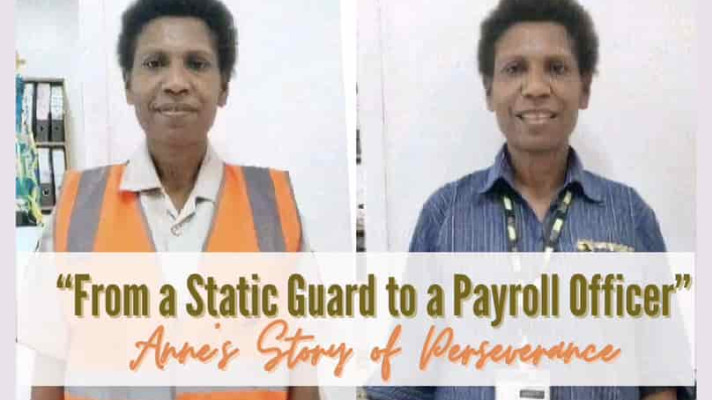
Anne, a devoted mother of three and a faithful church member and leader at Busanim Creek Seventh-day Adventist Church, had been tirelessly searching for a job to provide for her family for five long years. Despite her previous experience, she faced numerous challenges in her job search. Nevertheless, she remained steadfast in her faith, upholding her request to God in prayer while searching for opportunities.
Finally, one day, God blessed Anne with a position as a female guard with Guard Dog Security Service. She worked diligently in this position for six months until a payroll officer vacancy was advertised. Anne then prayerfully applied for the position, and her application reached the desk of the payroll officer.
To Anne's amazement, the payroll officer immediately called her for an interview. As Anne walked up to the office, the payroll officer could see tears of joy in her eyes as she signed the contract. It was a moment of divine blessing for Anne and her family.
Today, Anne is a purpose-driven, ambitious, and outstanding staff member who is always thankful for the opportunity she was given. She's glad to have crossed paths with the payroll officer who gave her a chance.
Anne's message to those who are still searching for employment is to do whatever your hand finds to do diligently, even if it is not your trade. She encourages people to stay focused on their goals, not to give up, and trust in God's perfect timing. Anne's story is a true testament to the power of perseverance and faith.
In conclusion, Anne's story is a powerful example of how perseverance and faith can lead to success. We hope that her story inspires others who may be going through a difficult time in their job search to trust in God and remain steadfast in their faith.
Oral Health Check Success
News Stories 20 Feb 2023 Media Officer

Busanim Creek Seventh-Day Adventist Church recently conducted its first health check for 2023 aimed at promoting good oral health among its members. The program was initiated by the Adventist Health department of the church and was facilitated by dentist Fred Sebastian of Your Dental Friend.
The health check was conducted over two days, starting yesterday and concluding today. The check mainly focused on removing cavities, treating sore teeth, and performing tooth implants. The program was initiated due to the high level of concern among Adventist members at Busanim Creek regarding their oral health.
On the first day of the program, many members turned up, joining the long queue to receive their oral health check. Unfortunately, some were sent back due to the shortage of anesthesia.
Today, the members returned to continue the check as well as to collect their tooth implants, prepared by the dentist. The program was deemed successful, and the health leader, Miriam Warahin, expressed her gratitude for the high turnout compared to the previous health checks conducted last year.
The health department of the church aims to improve the overall health of its members by conducting regular check-ups and promoting healthy habits. The success of this program is a testament to the commitment of the church and its members towards better health.
Small Thinking, Big Consequences: Look Beyond Yourself
Devotionals 14 Feb 2023 Unknown Author

The purpose that God has for our lives is greater than our own desires, and His wisdom is above our capacity to comprehend it (Isaiah 55:8–9). God wants us to see things the way He sees them, so we must let go of our worries and cares and accept that fact in order to fully treasure and abide in His plans (Proverbs 3:5–6).
The vision that God has placed in our lives can be received and used as a guide as well as a source of strength when we grow weary on the way (Habakkuk 2:2-3). The desires that God sows in our hearts are frequently greater than the plans we have, and they inspire us to serve others (Philippians 2:3–4).
God provides for our needs, but we must make choices that are in line with the talents and abilities He has given us, and we must be humble enough to recognize that His ways are not always what we would expect (James 4:6). God will grant us the opportunity to see the big picture and lead a fulfilling life when we put our attention on Him and seek Him first (Matthew 6:33).
Because of this, we need to focus on God's strength and mercy, accept His promises, and live humbly in accordance with His principles (Proverbs 16:3). We will be able to fully appreciate the bright future that God has planned for us if we base our decisions on His standards and put Him first (Jeremiah 29:11).
Against all odds: Man with injured spine defies doctors' predictions and walks again
Stories 11 Dec 2022 Joe Philip
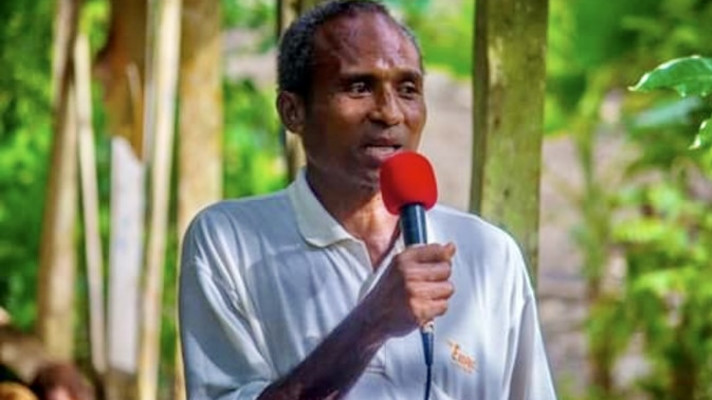
As Danny Kulu and his son Matthew hurried down the slippery path of Warakalap mountain, headed for the hospital, they knew they were facing an uphill battle. The young man on Danny's back was in great pain, and the wet conditions made the track treacherous. Despite being careful with his footing, Danny slipped and they both fell hard on the wet ground. Danny heard the crack from his back as he hit the ground, and his head went dizzy. He quickly got up, picked up his son, and hurried to the waiting vehicle.
Weeks later, Danny was advised to get an x-ray to determine the cause of his severe back pain. The x-ray revealed that he had dislocated and cracked his spine, and the doctors predicted that he could potentially be paralyzed. Danny was understandably scared and worried about his future, but he never lost hope in the power of God. He knew that with the Lord on his side, he would be able to overcome any obstacle.
After a month of prayer and trust in God, the Lord honored Danny's prayers and healed him. He was discharged from the hospital and returned home, eventually making his first visit to his church on crutches. Today, Danny is healed and able to walk from his home in Warakalap to attend church at Busanim Creek. He is now an elder at the church, grateful for the Lord's miraculous power in his life.
The Everlasting Encounter
Daily Lesson 16 Nov 2022 Sabbath School

Some popular preachers suggest that this “mystery” (1 Cor. 15:51) is the “secret rapture” of the church, which is to occur seven years prior to Christ’s glorious second coming. In this “secret rapture” faithful Christians are suddenly, quietly, and secretly whisked off to heaven while everyone else remains here wondering what happened to them. People might suddenly find themselves in a driverless car, because the driver was raptured to heaven, and all that “remains is their clothes.” The 16-volume best-selling Left Behind series, turned into four movies, promoted this false teaching, exposing millions to it.
Of course, no biblical passage endorses such an artificial distinction between the rapture and the Second Coming. The “mystery” Paul is referring to is simply the transformation of the living righteous to join the resurrected righteous at Christ’s second coming. This is the “rapture.” There is no “secret rapture” because the Second Coming will be visible to all living human beings (Rev. 1:7), and both the resurrection of the dead and the transformation of the living ones will occur at the sound of the trumpet at Christ’s return (1 Cor. 15:51, 52).
Christ’s second coming will bring about the most amazing encounter ever. The living righteous are changed “in a moment, in the twinkling of an eye” (1 Cor. 15:52). At the voice of God, they are glorified; now they are made immortal and with the risen saints are caught up to meet their Lord in the air. Angels “ ‘gather together His elect from the four winds, from one end of heaven to the other’ ” (Matt. 24:31, NKJV).
“Little children are borne by holy angels to their mothers’ arms. Friends long separated by death are united, nevermore to part, and with songs of gladness ascend together to the City of God.”
Supplemental Notes
The Lifegiver is coming to break the fetters of the tomb. He is to bring forth the captives and proclaim, “I am the resurrection and the life.” There stands the risen host. The last thought was of death and its pangs. The last thoughts they had were of the grave and the tomb, but now they proclaim, “O death, where is thy sting? O grave, where is thy victory” (1 Corinthians 15:55). The pangs of death were the last things they felt. . . .When they awake the pain is all gone. “O grave, where is thy victory?” here they stand and the finishing touch of immortality is put upon them and they go up to meet their Lord in the air. The gates of the city of God swing back upon their hinges, and the nations that have kept the truth enter in.—Selected Messages, book 3, pp. 430, 431.
When Christ shall come to the earth again, not as a prisoner surrounded by a rabble will men see Him. They will see Him then as heaven’s King. Christ will come in His own glory, in the glory of His Father, and the glory of the holy angels. Ten thousand times ten thousand, and thousands of thousands of angels, the beautiful and triumphant sons of God, possessing surpassing loveliness and glory, will escort Him on His way. Then shall He sit upon the throne of His glory, and before Him shall be gathered all nations. Then every eye shall see Him, and they also that pierced Him. In the place of a crown of thorns, He will wear a crown of glory,—a crown within a crown. In place of that old purple kingly robe, He will be clothed in raiment of whitest white, “so as no fuller on earth can white them.” Mark 9:3. And on His vesture and on His thigh a name will be written, “King of kings, and Lord of lords.” Revelation 19:16.—DA, p. 739.
Christ is coming with clouds and with great glory. A multitude of shining angels will attend Him. He will come to raise the dead, and to change the living saints from glory to glory. He will come to honor those who have loved Him, and kept His commandments, and to take them to Himself. He has not forgotten them nor His promise. There will be a relinking of the family chain. When we look upon our dead, we may think of the morning when the trump of God shall sound, when “the dead shall be raised incorruptible, and we shall be changed.” 1 Corinthians 15:52. A little longer, and we shall see the King in His beauty. A little longer, and He will wipe all tears from our eyes. A little longer, and He will present us “faultless before the presence of His glory with exceeding joy.” Jude 1:24. Wherefore, when He gave the signs of His coming He said, “When these things begin to come to pass, then look up, and lift up your heads; for your redemption draweth nigh.”—DA, p. 632.
The Dead Knows Nothing
Daily Lesson 11 Oct 2022 Sabbath School
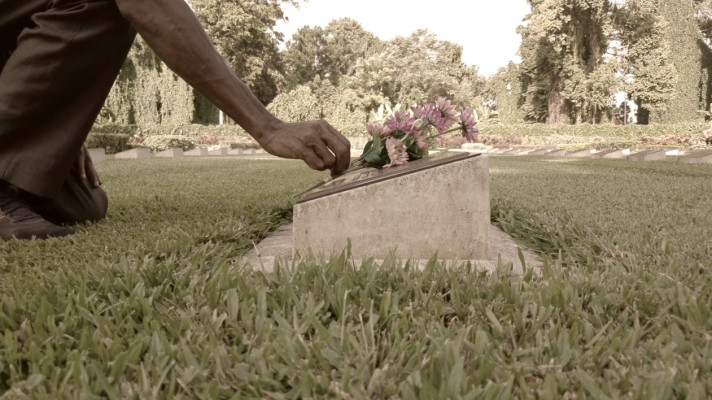
Read Job 3:11–13; Psalm 115:17; Psalm 146:4; and Ecclesiastes 9:5, 10. What can we learn from these passages about the condition of human beings at death?
Some Bible commentators argue that these passages (Job 3:11–13; Ps. 115:17; Ps. 146:4; Eccles. 9:5, 10), written in poetic language, cannot be used to define the condition of human beings at death. It is true that sometimes poetry can be ambiguous and easily misunderstood, but this is not the case with these verses. Their language is clear, and their concepts are in full harmony with the overall Old Testament teachings on the subject.
First, in Job 3, the patriarch deplores his own birth because of all the suffering. (In our more dire moments, who hasn’t wished that he or she had never been born?) He recognizes that if he had died at his birth, he would have remained asleep and at rest (Job 3:11, 13).
Psalm 115 defines the location where the dead are kept as a place of silence, because “the dead do not praise the Lord” (Ps. 115:17, NKJV). This hardly sounds as if the dead, the faithful (and thankful) dead, are in heaven worshiping God.
According to Psalm 146, the mental activities of the individual cease with death: “His spirit departs, he returns to the earth; on that very day his plans perish” (Ps. 146:4, NASB). This is a perfect biblical depiction of what happens at death.
Ecclesiastes 9 adds that “the dead know nothing” and in the grave “there is no work or device or knowledge or wisdom” (Eccles. 9:5, 10, NKJV). These statements confirm the biblical teaching that the dead are unconscious.
The biblical teaching of unconsciousness in death should not generate any panic in Christians. First of all, there is no everlasting burning hell or temporary purgatory waiting for those who die unsaved. Second, there is an amazing reward waiting for those who die in Christ. No wonder that “to the believer, death is but a small matter. . . . To the Christian, death is but a sleep, a moment of silence and darkness. The life is hid with Christ in God, and ‘when Christ, who is our life, shall appear, then shall ye also appear with Him in glory.’ John 8:51, 52; Col. 3:4.”—Ellen G. White, The Desire of Ages, p. 787.
Think about the dead in Christ. They close their eyes in death and, whether in the grave 1,500 years or five months, it’s all the same to them. The next thing they know is the return of Christ. How, then, might one argue that, in one sense, the dead have it better than we, the living, do?
Supplemental Notes
“But, mother,” said I, “do you really believe that the soul sleeps in the grave until the resurrection? Do you think that the Christian, when he dies, does not go immediately to heaven, nor the sinner to hell?”
She answered: “The Bible gives us no proof that there is an eternally burning hell. If there is such a place, it should be mentioned in the Sacred Book.” . . .
It was some months after this conversation before I heard anything further concerning this doctrine; but during this time my mind had been much exercised upon the subject. When I heard it preached, I believed it to be the truth. From the time that light in regard to the sleep of the dead dawned upon my mind, the mystery that had enshrouded the resurrection vanished, and the great event itself assumed a new and sublime importance. . . . If at death the soul entered upon eternal happiness or misery, where was the need of a resurrection of the poor moldering body?
But this new and beautiful faith taught me the reason why inspired writers had dwelt so much upon the resurrection of the body; it was because the entire being was slumbering in the grave. I could now clearly perceive the fallacy of our former position on this question.—Life Sketches of Ellen G. White, pp. 49, 50.
Christ became one with humanity, that humanity might become one in spirit and life with Him. By virtue of this union in obedience to the Word of God, His life becomes their life. He says to the penitent, “I am the resurrection, and the life” (John 11:25). Death is looked upon by Christ as sleep—silence, darkness, sleep. He speaks of it as if it were of little moment. “Whosoever liveth and believeth in me,” He says, “shall never die” (John 11:26). “If a man keep my saying, he shall never taste of death” (John 8:52). “He shall never see death” (John 8:51). And to the believing one, death is but a small matter. With him to die is but to sleep. “Them also which sleep in Jesus will God bring with him” (1 Thessalonians 4:14).—Selected Messages, book 1, p. 302.
Man was originally endowed with noble powers and a well-balanced mind. He was perfect in his being, and in harmony with God. His thoughts were pure, his aims holy. But through disobedience, his powers were perverted, and selfishness took the place of love. His nature became so weakened through transgression that it was impossible for him, in his own strength, to resist the power of evil. He was made captive by Satan, and would have remained so forever had not God specially interposed. It was the tempter’s purpose to thwart the divine plan in man’s creation, and fill the earth with woe and desolation. And he would point to all this evil as the result of God’s work in creating man.—Steps to Christ, p. 17.
Emily's Story
Stories 01 Oct 2022 Rachelle Glanville
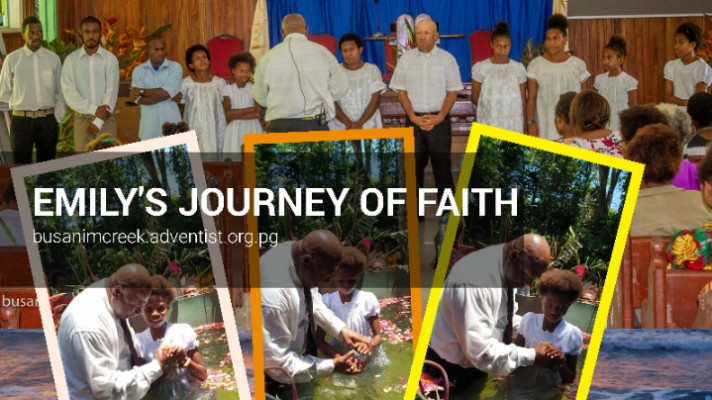
This is Emily, a 11 year old girl from Morobe Patrol Post. I came across this shy little girl 4 years ago. Emily is not an Adventist and she lives with her bubumeri or 'baka' up at Busanim mountain. She has a little sister named Esther about 4 yrs old which she takes along every Sabbath, Wednesdays and Fridays(FNF) to church. Since the day I met her I made it my business to take care of her. She was eager to join the Busanim Creek Adventurer Club so I bought her Adventurer uniform and registered her into the club. Little Emily became a little missionary to her family and witnessed to all her cousins, her aunts and even 'baka' or grandmother. While I was away on holiday last week, little Emily decided to be baptized. I didn’t know, no one even told me.
This Sabbath morning I saw little Emily dressed in white. I sat next to her and her little sister, not even a clue that she will be baptized. When they called the baptismal candidates to go in front little Emily stood up and walked to the front. I grabbed her hand and asked her if she's going to be baptized, she smiled back at me and replied, "yes". Fighting back all my tears I squeezed her hand and said ok as she made her way to the front to get ready for her baptism.
No family members were present to witness her baptism, just Emily herself and her little sister Esther.
I looked up to the sky and prayed, "Dear Lord take care of this young soul. Help me to be a mentor.
Heaven rejoices my child. God will not fail you 🙏
Story by: Rachelle Glanville
Read Original Post HERE
Loving Those Who Hurt Us
Daily Lesson 01 Sep 2022 Sabbath School

Someone once said: “Loving our enemies, then, does not mean that we are supposed to love the dirt in which the pearl is buried; rather it means that we love the pearl which lies in the dust. . . . God does not love us because we are by nature lovable. But we become lovable because He loves us.”
In Matthew 5:45, Jesus uses the example of His Father in heaven to illustrate how we should treat those who hurt us, who perhaps put us in the worst kind of crucibles. Jesus says that His Father sends the blessing of rain to both the righteous and the unrighteous; if God gives even the unjust rain, how then should we treat them?
Jesus isn’t trying to say that we should always have warm, fuzzy feelings toward everyone who causes us trouble, though this also may be possible. Fundamentally, love for our enemies is not meant to be a feeling we have for them but specific actions toward them that reveal care and consideration.
Jesus concludes this passage with a verse that often causes a lot of debate: “ ‘Be perfect, therefore, as your heavenly Father is perfect’ ” (Matt. 5:48, NIV). But the meaning is very clear in the context: those people who want to be perfect as God is perfect must show love to their enemies as God shows love to His. To be perfect in God’s sight is to love the opposition; and to do this takes a meekness of heart that only God can give.
Supplemental Notes
Do not allow bitter thoughts to continue to fill your mind. . . . Go to your brother and in humility and sincerity talk with him about the matter. . . .
All heaven is interested in the interview between the one who has been injured and the one who is in error. . . . The oil of love removes the soreness caused by the wrong. The Spirit of God binds heart to heart, and there is music in heaven over the union brought about. . . .
. . . It is not earthly rank, nor birth, nor nationality, nor religious privilege, which proves that we are members of the family of God; it is love, a love that embraces all humanity. Even sinners whose hearts are not utterly closed to God’s Spirit will respond to kindness. . . . [It] is only the Spirit of God that gives love for hatred. To be kind to the unthankful and to the evil, to do good hoping for nothing again, is the insignia of the royalty of heaven, the sure token by which the children of the Highest reveal their high estate.—Mind, Character, and Personality, vol. 2, pp. 529, 530.
God’s ideal for His children is higher than the highest human thought can reach. “Be ye therefore perfect, even as your Father which is in heaven is perfect.” This command is a promise. The plan of redemption contemplates our complete recovery from the power of Satan. Christ always separates the contrite soul from sin. He came to destroy the works of the devil, and He has made provision that the Holy Spirit shall be imparted to every repentant soul, to keep him from sinning. . . .
The ideal of Christian character is Christlikeness. . . . Jesus was in all things made like unto His brethren. He became flesh, even as we are. He was hungry and thirsty and weary. He was sustained by food and refreshed by sleep. He shared the lot of man; yet He was the blameless Son of God. He was God in the flesh. His character is to be ours. The Lord says of those who believe in Him, “I will dwell in them, and walk in them; and I will be their God, and they shall be My people.” 2 Corinthians 6:16.—The Desire of Ages, p. 311.
All that man needs to know or can know of God has been revealed in the life and character of His Son. . . .
Tender, compassionate, sympathetic, ever considerate of others, He represented the character of God, and was constantly engaged in service for God and man. . . .
“Love your enemies,” He bade them; “bless them that curse you, do good to them that hate you, and pray for them which despitefully use you, and persecute you; that ye may be the children of your Father which is in heaven;” “for He is kind unto the unthankful and to the evil.” “He maketh His sun to rise on the evil and on the good, and sendeth rain on the just and on the unjust.” “Be ye therefore merciful, as your Father also is merciful.” Matthew 5:44, 45; Luke 6:35, 36.—Testimonies for the Church, vol. 8, pp. 286, 287.
Are You Willing To Take Some Risks For God?
Devotionals 26 Aug 2022 Unknown Author

Following God is not easy. There will be moments when you need to sacrifice your own desires just for Him to be glorified. It requires faith and trust. Above all, it’s a great risk that you need to take. But living in God’s presence is more than a reward that you can receive here on earth. It’s a great privilege to know Him despite the brokenness and pain that you feel. The risks that you will take are nothing compared to the great blessings that God prepared. If you only learn to move forward and keep going despite the fears that you feel inside, then you will surely find it more rewarding to live according to His will. So the question is, are you willing to take some risks for His Kingdom to reign?
There is always a risk everywhere you go. You just have to choose what kind of challenges and obstacles you are willing to take. Choose the ones that are worth fighting for in the end. It appears to be very hard at first, but if you will just patiently wait for the seeds to bloom and bear fruits, then you will surely realize that all your hard works are never in vain. The key to taking some risks is to focus not on yourself but on the One who will walk with you. The path may not be that comfortable, but God is there to pick you up when you fall down. When you choose to take risks with Him, then you will experience so many fulfilling moments that you can never trade with worldly riches.
It’s going to be a different kind of risk. It’s a rewarding one. You will never know how it feels like if you won’t try. Go ahead and walk while holding His hands. If you feel scared, you can close your eyes and continue your journey with Him. Know that you will be safe because He will be there to lead you to the path that He created. He is aware of what’s coming. Trust Him, and you will be guided. It’s okay to take a step even in the wilderness. You can still find the strength that you need. When you journey with Him, all the risks that you will take will serve as a way for you to receive more of His blessings.
Don’t miss His moving in your life. The only One who can teach you how to truly live is the Creator himself. He will take you to unexpected roads and let you go through the wilderness, but those seasons will turn into wonderful memories that you can always cherish. In those moments, you will discover who God is, and you will be exposed to His mercy and grace.
To Carry All Our Worry
Daily Lesson 16 Aug 2022 Sabbath School

There is a plaque that some people have in their homes that reads “Why pray when you can worry?” It makes us laugh because we know how often we worry rather than come to God and give Him our concerns.
Someone once said that when our life becomes all tied up, we should give it to God and let Him untie the knots. How God must long to do this for us. Yet, amazingly, we manage to hang on to our problems until we are about to snap. Why do we wait until we are desperate before we go to the Lord?
Read 1 Peter 5:7. Peter is quoting from Psalm 55:22. What’s the basic message here for us? (See also Matt. 6:25–33.)
It is a very simple text. There is no secret hidden in it, and it means exactly what it says. To cast means to do just that, to throw, to give away, so that what is causing the aching and the concern no longer has any connection to you. But, of course, our burdens are not thrown just anywhere. Our worry does not disappear into a void. It is given to our Father in heaven, who promises to sort it out. That’s what Jesus is telling us in the verses in Matthew. The problem in doing this is not that it’s hard; rather, it’s that it just seems too easy, too good to be true.
Anxiety is caused by all sorts of things. It could be due to pressure from work, unexpected criticism, feeling that we are unwanted or unloved, health or financial worries, feeling that we are not good enough for God, or believing that we are not forgiven.
Whatever the reasons are, one reason we hang on to our problems is that we think we can sort them out better than anyone else can. But Peter urges us to reconsider any such idea. The reason we don’t have to worry is that God cares. But does God still care enough to intervene when a divorce is looming or we feel totally useless? The Bible says that He cares enough to transform any situation.
What are things that cause you worry now? However legitimate they are, however troublesome they are, is there anything too hard for the Lord? Maybe our biggest problem is that even though we believe that God knows about it and can fix it, we don’t believe that He will resolve it the way we would like it resolved. Dwell on that last point and ask yourself how true it is in your own life.
Supplemental Notes
The Lord desires us to appreciate the great plan of redemption, to realize our high privilege as the children of God, and to walk before Him in obedience, with grateful thanksgiving. He desires us to serve Him in newness of life, with gladness every day. He longs to see gratitude welling up in our hearts because our names are written in the Lamb’s book of life, because we may cast all our care upon Him who cares for us. He bids us rejoice because we are the heritage of the Lord, because the righteousness of Christ is the white robe of His saints, because we have the blessed hope of the soon coming of our Saviour.
To praise God in fullness and sincerity of heart is as much a duty as is prayer. We are to show to the world and to all the heavenly intelligences that we appreciate the wonderful love of God for fallen humanity and that we are expecting larger and yet larger blessings from His infinite fullness. Far more than we do, we need to speak of the precious chapters in our experience. After a special outpouring of the Holy Spirit, our joy in the Lord and our efficiency in His service would be greatly increased by recounting His goodness and His wonderful works in behalf of His children.
These exercises drive back the power of Satan. They expel the spirit of murmuring and complaint, and the tempter loses ground. They cultivate those attributes of character which will fit the dwellers on earth for the heavenly mansions.—Christ’s Object Lessons, pp. 299, 300.
Tenderly [Jesus] bade the toiling people, “Take My yoke upon you, and learn of Me; for I am meek and lowly in heart: and ye shall find rest unto your souls.” Matthew 11:29.
In these words, Christ was speaking to every human being. Whether they know it or not, all are weary and heavy-laden. All are weighed down with burdens that only Christ can remove. The heaviest burden that we bear is the burden of sin. If we were left to bear this burden, it would crush us. But the Sinless One has taken our place. “The Lord hath laid on Him the iniquity of us all.” Isaiah 53:6.
. . . He invites us to cast all our care upon Him; for He carries us upon His heart.
. . . He is watching over you, trembling child of God. Are you tempted? He will deliver. Are you weak? He will strengthen. Are you ignorant? He will enlighten. Are you wounded? He will heal. The Lord “telleth the number of the stars;” and yet “He healeth the broken in heart, and bindeth up their wounds.” Psalm 147:4, 3.
Whatever your anxieties and trials, spread out your case before the Lord. Your spirit will be braced for endurance. The way will be open for you to disentangle yourself from embarrassment and difficulty. The weaker and more helpless you know yourself to be, the stronger will you become in His strength. The heavier your burdens, the more blessed the rest in casting them upon your Burden Bearer.—The Ministry of Healing, pp. 71, 72.
God's Love is Greater Than Your Sins
Devotionals 06 Jul 2022 Unknown Author

You can never put God inside a box. His love is so deep and wide. No one can ever fathom the depths of His compassion and grace. Your mistakes are nothing compared to His power. So if you are so disappointed with yourself because of the wrong decisions that you committed, then don’t hide away from His presence. Seek His love and trust in His goodness. Remember the blessings that He gave you so that you will no longer be scared to approach Him. Do not dwell on the bad things that happened in your life. You can take note of the lesson, but don’t allow your emotions to affect your actions. Be humble and choose to stay in His presence.
Focus on His love. You will find it hard to keep moving if all you see are the negative things that happened. You won’t see the bigger picture, and you will fail to notice the blessings that God provided. That’s why reminisce the good things that you experienced, especially those moments when you witness His miracles. In such a way, you will slowly feel God’s loving embrace. When you already carry the consequences of your wrong decisions, choose to lift your hands in worship and let the lyrics of the songs remind you how wonderful and glorious your Savior is.
There are hidden blessings behind all your mistakes. There are wonderful treasures that you can get. One thing that can help you so that you can move forward is to set your eyes on the lessons that you learned. Keep those lessons because you will use them, especially in handling bigger problems. Try to look at the things that you can change and improve. Do not allow the frustrations to control your thoughts. Instead, thank God for giving you the chance to grow in His arms. Things will be okay. You will soon recover, and you will see yourself from a different perspective. He is preparing everything ahead, so don’t worry.
God will never stop loving you. He hates sin, but all you need to do is ask for His forgiveness and choose to repent. After that, He will give you the strength you need to keep moving. He will show you how powerful and big He is. His goodness will change the way you perceive yourself. And He will open your eyes to the things you fail to appreciate. Do not be dismayed. Your Heavenly Father is waiting for you to accept His mercy and love.
A Guide for the Journey | Jesus The Shepherd
Daily Lesson 25 Jun 2022 Unknown Author
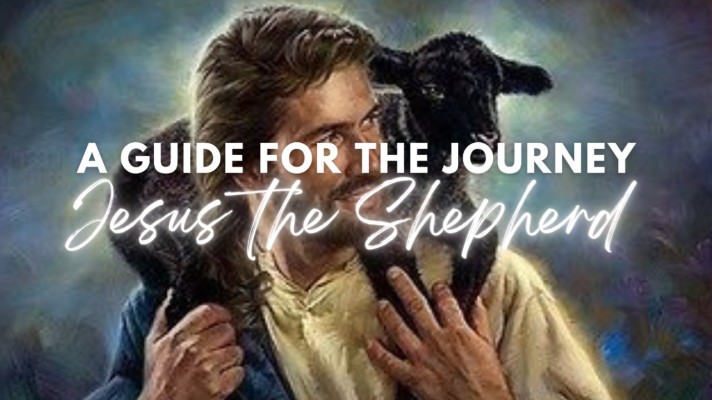
“The Lord is my shepherd; I shall not want” (Ps. 23:1, NKJV).
Some children were asked to draw a picture of God. Without exception, each one drew a picture with a heart somewhere in it. When asked why, they declared unanimously that God is love. It was as simple as that.
It is easy to have a good opinion of God and His purposes when everything is going well. But as we grow older and life becomes harder and more complicated, our view of God often changes. God doesn’t change, of course (Heb. 13:8, James 1:17), but we do.
Because of the pastoral lifestyle of the people in Old Testament times, Psalm 23 uses the image of a shepherd to describe the way God cares for us. The symbol of a shepherd is used for God—in both the Old Testament and the New Testament. It’s a wonderful picture and one that is changeless, too. Before we look at Psalm 23, let’s survey how different Bible writers understand the work and character of the Shepherd throughout the Bible.
Supplemental Notes
As the shepherd loves his sheep, and cannot rest if even one be missing, so, in an infinitely higher degree, does God love every outcast soul. Men may deny the claim of His love, they may wander from Him, they may choose another master; yet they are God’s, and He longs to recover His own. He says, “As a shepherd seeketh out his flock in the day that he is among his sheep that are scattered; so will I seek out My sheep, and will deliver them out of all places where they have been scattered in the cloudy and dark day.” Ezekiel 34:12.
In the parable the shepherd goes out to search for one sheep—the very least that can be numbered. So if there had been but one lost soul, Christ would have died for that one.
The sheep that has strayed from the fold is the most helpless of all creatures. It must be sought for by the shepherd, for it cannot find its way back. So with the soul that has wandered away from God; he is as helpless as the lost sheep, and unless divine love had come to his rescue he could never find his way to God.—Christ’s Object Lessons, p. 187.
However much a shepherd may love his sheep, he loves his sons and daughters more. Jesus is not only our shepherd; He is our “everlasting Father.” And He says, “I know Mine own, and Mine own know Me, even as the Father knoweth Me, and I know the Father.” John 10:14, 15, R. V. What a statement is this!—the only-begotten Son, He who is in the bosom of the Father, He whom God has declared to be “the Man that is My fellow” (Zechariah 13:7),—the communion between Him and the eternal God is taken to represent the communion between Christ and His children on the earth!
Because we are the gift of His Father, and the reward of His work, Jesus loves us. He loves us as His children. Reader, He loves you. Heaven itself can bestow nothing greater, nothing better. Therefore trust.—The Desire of Ages, p. 483.
While we review, not the dark chapters in our experience, but the manifestations of God’s great mercy and unfailing love, we shall praise far more than complain. We shall talk of the loving faithfulness of God as the true, tender, compassionate shepherd of His flock, which He has declared that none shall pluck out of His hand. The language of the heart will not be selfish murmuring and repining. Praise, like clear-flowing streams, will come from God’s truly believing ones. “Goodness and mercy shall follow me all the days of my life: and I will dwell in the house of the Lord forever.” “Thou shalt guide me with Thy counsel, and afterward receive me to glory. Whom have I in heaven but Thee? And there is none upon earth that I desire beside Thee.” Psalm 23:6; 73:24, 25.—Testimonies for the Church, vol. 6, pp. 367, 368.
Wrestling with God
Daily Lesson 02 Jun 2022 Unknown Author

Gone from Laban, Jacob soon has another experience with God. Knowing that his brother, Esau, is coming with “ ‘four hundred men’ ” (Gen. 32:6), Jacob prays fervently to the Lord, even though he acknowledges that “ ‘I am not worthy of the least of all the mercies and of all the truth which You have shown Your servant’ ” (Gen. 32:10, NKJV). Jacob, truly, has a better understanding of what grace was about.
Jacob is distressed, understandably so, by what is happening, and after doing what he can to protect his family, he camps for the night. He is then suddenly attacked by “a Man” (Gen. 32:24, NKJV). This is a term that can have special connotations, evoking the divine presence (see Isa. 53:3). Daniel used it to refer to the heavenly priest Michael (Dan. 10:5); it also was the word used by Joshua to depict the “Commander of the Lord’s army,” who was the Lord YHWH Himself (Josh. 5:13–15, NKJV).
Indeed, amid the fighting, it must have become obvious to Jacob that he was struggling with God Himself, as his words, “ ‘I will not let You go unless You bless me!’ ” (Gen. 32:26, NKJV), revealed. Yet, his fervent clinging to God, his refusal to let go, also revealed his passionate desire for forgiveness and to be right with his Lord.
“The error that had led to Jacob’s sin in obtaining the birthright by fraud was now clearly set before him. He had not trusted God’s promises, but had sought by his own efforts to bring about that which God would have accomplished in His own time and way.”— Patriarchs and Prophets, pp. 197, 198.
And the evidence that he had been forgiven was the change of his name from the reminder of his sin to one that commemorated his victory. “ ‘Your name,’ ” said the Angel, “ ‘shall no longer be called Jacob [the supplanter], but Israel; for you have struggled with God and with men, and have prevailed’ ” (Gen. 32:28, NKJV).
Supplemental Notes
Jacob’s night of anguish, when he wrestled in prayer for deliverance from the hand of Esau (Genesis 32:24-30), represents the experience of God’s people in the time of trouble. Because of the deception practiced to secure his father’s blessing, intended for Esau, Jacob had fled for his life, alarmed by his brother’s deadly threats. After remaining for many years an exile, he had set out, at God’s command, to return with his wives and children, his flocks and herds, to his native country. On reaching the borders of the land, he was filled with terror by the tidings of Esau’s approach at the head of a band of warriors, doubtless bent upon revenge. Jacob’s company, unarmed and defenseless, seemed about to fall helpless victims of violence and slaughter. And to the burden of anxiety and fear was added the crushing weight of self-reproach, for it was his own sin that had brought this danger. His only hope was in the mercy of God; his only defense must be prayer. . . .
. . . In the darkness and solitude he continues praying and humbling himself before God. Suddenly a hand is laid upon his shoulder. He thinks that an enemy is seeking his life, and with all the energy of despair he wrestles with his assailant. As the day begins to break, the stranger puts forth his superhuman power; at his touch the strong man seems paralyzed, and he falls, a helpless, weeping suppliant, upon the neck of his mysterious antagonist. Jacob knows now that it is the Angel of the covenant with whom he has been in conflict. Though disabled and suffering the keenest pain, he does not relinquish his purpose. Long has he endured perplexity, remorse, and trouble for his sin; now he must have the assurance that it is pardoned. . . . The patriarch exclaims, “I will not let Thee go, except Thou bless me.” What confidence, what firmness and perseverance, are here displayed! . . . His was the assurance of one who confesses his weakness and unworthiness, yet trusts the mercy of a covenant-keeping God. . . .
. . . He had fastened his trembling grasp upon the promises of God, and the heart of Infinite Love could not turn away the sinner’s plea. As an evidence of his triumph and an encouragement to others to imitate his example, his name was changed from one which was a reminder of his sin, to one that commemorated his victory.—The Great Controversy, pp. 616, 617.
Jesus knows the circumstances of every soul. You may say, I am sinful, very sinful. You may be; but the worse you are, the more you need Jesus. He turns no weeping, contrite one away. He does not tell to any all that He might reveal, but He bids every trembling soul take courage. Freely will He pardon all who come to Him for forgiveness and restoration. . . .
The souls that turn to Him for refuge, Jesus lifts above the accusing and the strife of tongues. No man or evil angel can impeach these souls. Christ unites them to His own divine-human nature. They stand beside the great Sin Bearer, in the light proceeding from the throne of God.—The Desire of Ages, p. 568.
FURTHER THOUGHT
“Jacob’s experience during that night of wrestling and anguish represents the trial through which the people of God must pass just before Christ’s second coming. . . . Such will be the experience of God’s people in their final struggle with the powers of evil. God will test their faith, their perseverance, their confidence in His power to deliver them. Satan will endeavor to terrify them with the thought that their cases are hopeless; that their sins have been too great to receive pardon. They will have a deep sense of their shortcomings, and as they review their lives their hopes will sink. But remembering the greatness of God’s mercy, and their own sincere repentance, they will plead His promises made through Christ to helpless, repenting sinners. Their faith will not fail because their prayers are not immediately answered. They will lay hold of the strength of God, as Jacob laid hold of the Angel, and the language of their souls will be, ‘I will not let Thee go, except Thou bless me.’ . . .
“Yet Jacob’s history is an assurance that God will not cast off those who have been betrayed into sin, but who have returned unto Him with true repentance. It was by self-surrender and confiding faith that Jacob gained what he had failed to gain by conflict in his own strength. God thus taught His servant that divine power and grace alone could give him the blessing he craved. Thus it will be with those who live in the last days. As dangers surround them, and despair seizes upon the soul, they must depend solely upon the merits of the atonement. We can do nothing of ourselves.”— Patriarchs and Prophets, pp. 201–203.
The Deceiver Deceived
Daily Lesson 23 May 2022 Unknown Author

The first thing that Jacob sees when he arrives at the place of destination is a stone, perhaps a hint referring back to the stone of Bethel, which signified God’s presence (Gen. 28:18, 19). It is this stone that will, after all, give Jacob the opportunity to interact with Rachel. When Jacob hears from the standing shepherds that Rachel is coming with her sheep to water her flock, he urges the shepherds to roll away the stone. They refuse, which gives Jacob the opportunity to do it alone, and to introduce himself to Rachel (Gen. 29:11).
Rachel responds by running to her family. This first contact between Jacob and Rachel was productive: “Jacob loved Rachel” (Gen. 29:18), so much that the seven years he worked for Laban in exchange for Rachel were like “a few days” (Gen. 29:20).
However, after these seven years, Jacob is deceived. On the night of the wedding, it is Leah, the elder sister, and not Rachel, whom Jacob discovers in his bed. Taking advantage of the confusion of the feast and of Jacob’s intense emotion and vulnerability, Laban had managed this trick. Interestingly, Jacob uses the same root word for “deceive” (Gen. 29:25, NKJV) that Isaac had used to characterize Jacob’s behavior toward his father and his brother (Gen. 27:35).
Note that the same thinking also is implied in the lex talionis (law of retaliation), “eye for eye, tooth for tooth” (Exod. 21:24; compare with Gen. 9:6), which forces the culprit to identify with his or her victim in that the culprit faces what the victim did. In a similar way, then, what Jacob had done to someone else had now been done to him.
Jacob understands now what it means to be the victim of deception. Ironically, God teaches Jacob about his own deception through Laban’s deception. Although Jacob as “deceiver” (Gen. 27:12) knows well what deception means, he is surprised when he is the victim of deception. Thus, he asks the question, “ ‘Why . . . have you deceived me?’ ” (Gen. 29:25, NKJV), which shows that he knows deception is wrong.
Supplemental EGW Notes
Seven years of faithful service Jacob gave for Rachel, and the years that he served “seemed unto him but a few days, for the love he had to her.” But the selfish and grasping Laban, desiring to retain so valuable a helper, practiced a cruel deception in substituting Leah for Rachel. . . . His indignant rebuke to Laban was met with the offer of Rachel for another seven years’ service. But the father insisted that Leah should not be discarded, since this would bring disgrace upon the family. Jacob was thus placed in a most painful and trying position; he finally decided to retain Leah and marry Rachel. Rachel was ever the one best loved; but his preference for her excited envy and jealousy, and his life was embittered by the rivalry between the sister-wives.
For twenty years Jacob remained in Mesopotamia, laboring in the service of Laban, who, disregarding the ties of kinship, was bent upon securing to himself all the benefits of their connection. Fourteen years of toil he demanded for his two daughters; and during the remaining period, Jacob’s wages were ten times changed. Yet Jacob’s service was diligent and faithful.—Patriarchs and Prophets, pp. 189, 190.
Deceit, falsehood, and unfaithfulness may be glossed over and hidden from the eyes of man, but not from the eyes of God. The angels of God, who watch the development of character and weigh moral worth, record in the books of heaven these minor transactions which reveal character. If a workman in the daily vocations of life is unfaithful and slights his work, the world will not judge incorrectly if they estimate his standard in religion according to his standard in business.
“He that is faithful in that which is least is faithful also in much: and he that is unjust in the least is unjust also in much.” It is not the magnitude of the matter that makes it fair or unfair. As a man deals with his fellow men, so will he deal with God. He that is unfaithful in the mammon of unrighteousness, will never be entrusted with the true riches. The children of God should not fail to remember that in all their business transactions they are being proved, weighed in the balances of the sanctuary.—Testimonies for the Church, vol. 4, pp. 310, 311.
Jesus took upon Himself man’s nature, that He might leave a pattern for humanity, complete, perfect. He proposes to make us like Himself, true in every purpose, feeling, and thought—true in heart, soul, and life. This is Christianity. Our fallen nature must be purified, ennobled, consecrated by obedience to the truth. Christian faith will never harmonize with worldly principles; Christian integrity is opposed to all deception and pretense. The man who cherishes the most of Christ’s love in the soul, who reflects the Saviour’s image most perfectly, is in the sight of God the truest, most noble, most honorable man upon the earth.—Testimonies for the Church, vol. 5, p. 235.
Jacob's Ladder
Daily Lesson 22 May 2022 Unknown Author
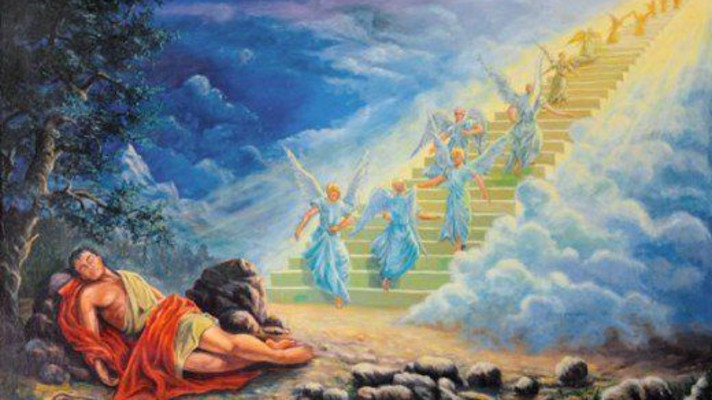
As soon as Esau learns that Jacob has received his father’s blessing, he understands that he has been deceived and supplanted by his brother (Gen. 27:36), and he wants to kill him (Gen. 27:42). Rebekah is worried and wants to prevent this crime that would be fatal for both sons (Gen. 27:45). So, with the support of Isaac (Gen. 28:5), she urges Jacob to flee to her family (Gen. 27:43). On his way to exile, Jacob encounters God in a dream at a place that he will call Bethel, “the house of God,” and there will make a vow.
In this dream, Jacob sees an extraordinary ladder that is connected with God. The same Hebrew verb, natsav, is used to refer to the ladder that is “set up” (Gen. 28:12, NKJV) and the Lord who “stood” (Gen. 28:13, NKJV), as if the ladder and the Lord are the same thing.
The ladder is linked to the attempt at Babel to reach heaven. Like the Tower of Babel, the ladder is to reach the “door of heaven.” But while the Tower of Babel represents the human effort to go up and reach God, the ladder of Bethel emphasizes that access to God can be achieved only through God’s coming to us, and not through human effort.
As for the “stone” on which Jacob has put his head and had his dream, it becomes the symbol of beth-El, “the house of God” (Gen. 28:17; compare with Gen. 28:22), which points to the temple, the sanctuary, the center of God’s saving activity for humanity.
Yet, Jacob does not limit to the spiritual and the mystical his expression of worship and sense of awe concerning what had happened to him. That is, he wanted to respond in concrete, outward terms. Thus, Jacob decides to “give a tenth” to God, not in order to obtain God’s blessing but as a grateful response to God’s gift, which already has been given to him. Here again we see the idea of tithe long before the rise of the nation of Israel.
Supplementary EGW Notes
Threatened with death by the wrath of Esau, Jacob went out from his father’s home a fugitive; but he carried with him the father’s blessing; Isaac had renewed to him the covenant promise, and had bidden him, as its inheritor, to seek a wife of his mother’s family in Mesopotamia. Yet it was with a deeply troubled heart that Jacob set out on his lonely journey. With only his staff in his hand he must travel hundreds of miles through a country inhabited by wild, roving tribes. In his remorse and timidity he sought to avoid men, lest he should be traced by his angry brother. He feared that he had lost forever the blessing that God had purposed to give him. . . .
But God did not forsake Jacob. His mercy was still extended to His erring, distrustful servant. The Lord compassionately revealed just what Jacob needed—a Saviour. He had sinned, but his heart was filled with gratitude as he saw revealed a way by which he could be restored to the favor of God.
Wearied with his journey, the wanderer lay down upon the ground, with a stone for his pillow. As he slept he beheld a ladder, bright and shining, whose base rested upon the earth, while the top reached to heaven. Upon this ladder angels were ascending and descending; above it was the Lord of glory, and from the heavens His voice was heard: “I am the Lord God of Abraham thy father, and the God of Isaac.” The land whereon he lay as an exile and fugitive was promised to him and to his posterity, with the assurance, “In thee and in thy seed shall all the families of the earth be blessed.” This promise had been given to Abraham and to Isaac, and now it was renewed to Jacob. Then in special regard to his present loneliness and distress, the words of comfort and encouragement were spoken: “Behold, I am with thee, and will keep thee in all places whither thou goest, and will bring thee again into this land; for I will not leave thee, until I have done that which I have spoken to thee of.”—Patriarchs and Prophets, pp. 183, 184.
Our time, our talents, our property, should be sacredly devoted to Him who has given us these blessings in trust. Whenever a special deliverance is wrought in our behalf, or new and unexpected favors are granted us, we should acknowledge God’s goodness, not only by expressing our gratitude in words, but, like Jacob, by gifts and offerings to His cause. As we are continually receiving the blessings of God, so we are to be continually giving.
“Of all that Thou shalt give me,” said Jacob, “I will surely give the tenth unto Thee.” Shall we who enjoy the full light and privileges of the gospel be content to give less to God than was given by those who lived in the former, less favored dispensation? Nay, as the blessings we enjoy are greater, are not our obligations correspondingly increased? But how small the estimate; how vain the endeavor to measure with mathematical rules, time, money, and love, against a love so immeasurable and a gift of such inconceivable worth.—Patriarchs and Prophets, pp. 187, 188.
Wait on the LORD
Devotionals 03 Mar 2022 Unknown Author

God knows the perfect timing. When He asks you to wait, then it means, He is preparing things that are beyond what you can imagine. So do not be in a hurry. Do not focus on your own timeline. Instead, acknowledge the will of God and let Him do His thing. The waiting season may not be that easy, but be strong and take heart! Choose to trust in His promises because He will fulfill all of them. He is always faithful, and He knows what He is doing. Let your faith be greater than your doubts. Believe in Him and enjoy the process of waiting.
I pray that you will choose to wait for the Lord and stop following your own schedule.
Even Broken Telephones Can Save Souls
News Stories 06 Jan 2022 Jeff Bishop

In 1997, the Bishop family became missionaries for the Gogodala project in Papua New Guinea (PNG) with Adventist Frontier Missions (AFM). When Jeff Bishop left Grand Rapids, Michigan, where he had been teaching for the past four years, he missed his students. After arriving in Balimo, the Middle Fly District of the Western Province of PNG, he met a teacher who was the principal of the Balimo government elementary school, Daniel Sewanene.
One day about a month after the Bishops arrived in PNG, Jeff asked Daniel if he could take a video of a few of the teachers’ classrooms so that he could send the video back to his students at Grand Rapids Junior Academy.
After filming the video in the kindergarten classroom, where a woman named Alice was the teacher, Jeff stopped by the next day to thank her for letting him take a video of her students. He then told her that he had already sent the video to his students back in the United States.
After Jeff informed her of what he had done with the video, Alice asked Jeff if he would get her a book the next time he went to Port Moresby, the capital city of PNG, but unfortunately, she couldn’t remember the name of the book. She said that she had been listening to a radio program a few days earlier and the person on the show had mentioned that his listeners should purchase that book in particular. She had sensed that this suggestion was very important.
Jeff wondered if it might have been Adventist World Radio (AWR) that she had been listening to, since they had a radio program in PNG. Jeff decided to pick a book that he thought could have been suggested on the radio program, especially if it was AWR. So he asked Alice if the name of the book was The Great Controversy. Alice exclaimed, “YES! That was the name of the book!” Jeff was very surprised that he was able to accurately guess the actual book she sought.
Determined to help, Jeff went to see a government worker named Judah. Judah was the only government official Jeff knew, so Jeff went to Judah’s office to see if there was a phone he could use to order The Great Controversy. Judah told Jeff that he had the only government phone in Balimo City, but that the phone didn’t always work, but he could try.
Jeff was able to contact Les Anderson, the manager of Adventist Aviation, who was also a pilot, about getting him The Great Controversy. Les said that he was going to the union office in Lae the next day and would pick up some books for him. He mentioned that the union office was selling a three-book set including The Desire of Ages, The Great Controversy and Steps to Christ for 5 Kina. Jeff ordered five sets of books.
The day before Les was scheduled to drop off the books in Balimo, Jeff asked Judah again if he could make one more phone call to Adventist Aviation to see when Les was due to arrive at the Balimo airport. However, the phone did not work. In fact, that phone never worked again the entire five years they lived in PNG. God had enabled the phone to work just so Jeff could order Alice’s books! Within just three days, Alice received her set of books, and began reading The Great Controversy.
A few months later, Alice was in the Balimo Medical Center. With no running water, electricity or doctors, this center was not a hospital, however, they did have a roof over their heads, windows for light to come in, and nurses. Alice was suffering from asthma and having a hard time breathing. The nurses were trying to find a vein to insert an IV to give her medicine for her breathing, but just couldn’t find a vein anywhere.
As Alice lay there thinking she was going to die, she started considering accepting the Sabbath, which she had read about in The Great Controversy. Then all of a sudden, she said, “OK, God! I accept it. I accept the Sabbath, and I will keep it.”
Immediately after making that decision, the nurse found a vein and inserted the needle so they could give her the medicine. The medicine immediately solved Alice’s breathing issues and she survived. Alice eventually became the first person in Balimo, after Jeff and his family arrived to start the missionary project, to request baptism into the Seventh-day Adventist Church, because she heard about a book called The Great Controversy on AWR in Balimo City.
When Jeff traveled back to Balimo in 2012, a full 10 years after he had to return to America, he met with Alice to see how she was doing. She told him that the government eventually asked her to move to Awaba Village on the Aramia River and teach at the Awaba Secondary School. Whilst there, she was able to convince village members to start a Seventh-day Adventist Church.
Jeff witnessed God’s handiwork and it was nothing short of a miracle!
Link: https://bit.ly/3reFrCz
Another Successful Year for Busanim Creek Adventist Youth Ministries
News Stories 12 Dec 2021 Adrian Ales

Busanim Creek AYM (Adventist Youth Ministry) ended the year successfully with an investiture program yesterday despite the many hardships faced.
A total of 68 registered AYM members of Busanim Creek Adventist church were awarded pins and honours for their unwavering faith and faithfulness to the club despite having faced many challenges throughout this year, 2021.
The year 2021 was a very challenging year for the club. “The two major challenges we faced were the COVID-19 lockdowns and secondly, a good number of our club members were mostly new interests with non-Adventist backgrounds,” said Busanim Creek Pathfinder Director, Mrs. Kalibe Pangai “but with Christ on our side we managed to make it through,” she added.
With so many sabbaths missed due to the COVID-19 lockdowns, the Busanim Creek AYM club leaders and directors managed to call in a “Catch-Up” weekend camp on the Friday, 26th of November to Sunday, 28th of November 2021 where most club requirements and honours were done.
It was a tearful yet joyous moment for the dedicated club leaders and committed parents who managed to push through. Busanim Creek Adventist Church was the last one among the 8th organised churches in the new Huon District to finally invest its club members for the year 2021.